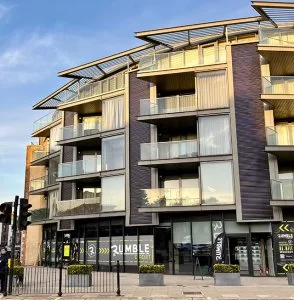Commercial Lease Renewal
Expert guidance on lease renewals
Our commercial property lawyers are here to help and guide landlords and tenants who are coming to the end of a commercial lease term. We have a wealth of experience in dealing with business lease renewals, both in opposed and unopposed cases.
Commercial Lease Renewal Process
This page will guide you through the process and answer many of your questions about each party’s rights and obligations under The Landlord and Tenant Act 1954. You will learn more about the commercial property solicitors at Osbornes, including how our approach to lease renewal negotiations can result in positive outcomes for your business.
Business leases come in all shapes and sizes. We represent both landlords and tenants with commercial lease renewals, and our experience covers all types of commercial property including office, retail, industrial and leisure premises. Our solicitors work with everything from high street takeaways to flagship stores with multi-million-pound rents.
The Landlord and Tenant Act 1954 (‘the 1954 Act’) provides stability for business tenants and gives them ‘security of tenure’ in most cases. If the lease enjoys the protection of Part II of the 1954 Act, it will not automatically come to an end when the fixed term expires. Rather, the tenant has the right to apply for a new tenancy and the landlord must grant this request unless there is a specific legal reason to oppose the renewal.
If you are a landlord or a tenant of commercial premises, you will need to make some decisions in plenty of time as the term of the lease comes to an end. Our aim is to help you take the right course of action that’s best for your business. This might include:
- Applying for a lease renewal under the 1954 Act
- Opposing a lease renewal, if a statutory reason applies
- Negotiating terms for renewing the lease
- Asking the Court to make a decision if the parties cannot come to an agreement
- Forming alternative plans
What is the Landlord and Tenant Act 1954?
Most business leases are protected under the Landlord and Tenant Act 1954, a piece of legislation that ensures a landlord cannot throw the tenant out onto the street when their business lease comes to an end.
The Act gives tenants two basic protections:
- The right to remain in the premises at the same rent and on the same terms after the lease comes to an end; and
- The right to automatically renew their lease in certain circumstances.
Some leases are not protected by the 1954 Act. Usually, this happens where the parties have built a clause into the original lease to opt-out of the Act’s protections. A commercial lease renewal solicitor will be able to tell you if the tenant has the right to renew. If they do not, the lease will end on a specified date and the tenant must vacate the property.
Who can initiate a commercial lease renewal?
Either the landlord or tenant can initiate the lease renewal procedure. The 1954 Act sets out a strict procedure and time limits for the service of notices, counter notices and a court application. The time limits are critical – if they are missed, the right to renew the lease may be lost.
The landlord can activate the lease renewal procedure by serving a section 25 notice. This will state a termination date for the tenancy between six and 12 months from the date of the notice. The notice indicates whether the landlord will oppose a lease renewal and, if the landlord does object, clearly state a reason why they do not wish to grant a new lease.
A tenant can activate the lease renewal procedure by serving a Section 26 notice seeking a new lease and proposing the terms for a new tenancy. The same time frames apply, so it is important to start thinking about your options around a year before the lease comes to an end.
Can a landlord refuse to renew a commercial lease?
A landlord cannot refuse a lease renewal simply because they do not like the tenant. They can, however, oppose the renewal for one of the specified grounds laid down in the 1954 Act. The most common reasons are:
- Repeated non-payment of rent
- Tenant’s failure to repair the premises
- The landlord wants to occupy the premises for the purpose of its own business
- The landlord wishes to redevelop the property
For a full list of permitted reasons, it’s best to get in touch with a legal professional. You will need to take specific actions depending on the circumstances. The lease will continue until appropriate action is taken which may not be your business goal.
What will be the terms of the new lease?
Once both parties agree that the lease will continue, the next step is negotiating the new terms. These terms can be whatever the parties agree. If they can’t agree, a Judge can decide the terms. In reality, it is extremely rare to go to court as most renewal leases are agreed between the parties and their professional advisors.
As a rule of thumb, the new lease will follow the terms of the old lease unless there is a good reason to make a change. The new rent generally will be the open market rent at the time of the lease renewal. Surveyors can determine the new rent and agree other key terms such as the term of the new lease and any break clauses.
How can a commercial lease solicitor help with my lease renewal?
Commercial lease renewals can be complicated and time-consuming, and they often require a joined-up approach from commercial property solicitors and property litigation solicitors. It is critical to be proactive and diarise key dates; otherwise, the right to renew the lease (or oppose its renewal) may be lost.
In addition, the parties will want to avoid other problems associated with lease expiry such as unwanted tenants remaining in occupation, or the tenant having an ‘irregular’ occupation and being vulnerable to losing the property. Hiring a solicitor is essential to avoid any unintended consequences.
At Osbornes, we offer a responsive service, with expert commercial lease solicitors always on hand to give astute and pragmatic advice. Our approach is to get a thorough understanding of your business and its commercial goals, so that we can help you achieve the outcomes you’re trying to achieve.
Why choose Osbornes for a commercial lease renewal?
As commercial lease specialists with more than 40 years’ experience, Osbornes has in-depth knowledge of the Landlord and Tenant Act 1954 and all aspects of commercial property law, to help you achieve your business objectives. Our clients give the following reasons why they choose to work with us:
- Breadth of experience in both unopposed and contentious lease renewal claims
- Professional and proactive approach
- Featured in the Spears 500 directory in recognition of our high standard of advice in commercial property law
- Clear, solutions-focused advice from a team that understands the commercial issues as well as the legal issues
- Accessibility and ability to communicate complex legal concepts in a non-technical way
Contact us today for a free initial consultation on your commercial lease renewal options. We are happy to answer all of your questions. Contact us by:
- Filling in our online enquiry form; or
- Calling us on 020 7485 8811
Lease Renewal FAQs
What is the Landlord and Tenant Act 1954?
Most business leases are protected under the Landlord and Tenant Act 1954, a piece of legislation that ensures a landlord cannot throw the tenant out onto the street when their business lease comes to an end.
The Act gives tenants two basic protections:
- The right to remain in the premises at the same rent and on the same terms after the lease comes to an end; and
- The right to automatically renew their lease in certain circumstances.
Some leases are not protected by the 1954 Act. Usually, this happens where the parties have built a clause into the original lease to opt-out of the Act’s protections. A commercial lease renewal solicitor will be able to tell you if the tenant has the right to renew. If they do not, the lease will end on a specified date and the tenant must vacate the property.
Who can initiate a commercial lease renewal?
Either the landlord or tenant can initiate the lease renewal procedure. The 1954 Act sets out a strict procedure and time limits for the service of notices, counter notices and a court application. The time limits are critical – if they are missed, the right to renew the lease may be lost.
The landlord can activate the lease renewal procedure by serving a section 25 notice. This will state a termination date for the tenancy between six and 12 months from the date of the notice. The notice indicates whether the landlord will oppose a lease renewal and, if the landlord does object, clearly state a reason why they do not wish to grant a new lease.
A tenant can activate the lease renewal procedure by serving a Section 26 notice seeking a new lease and proposing the terms for a new tenancy. The same time frames apply, so it is important to start thinking about your options around a year before the lease comes to an end.
Can a landlord forfeit a commercial lease?
Forfeiture of a commercial lease may occur in cases of significant breaches of the lease terms, such as non-payment of rent or failure to repair. For more information on the conditions under which a landlord can end a lease agreement, read our page on forfeiture of commercial leases.
What will be the terms of the new lease?
Once both parties agree that the lease will continue, the next step is negotiating the new terms. These terms can be whatever the parties agree. If they can’t agree, a Judge can decide the terms. In reality, it is extremely rare to go to court as most renewal leases are agreed between the parties and their professional advisors.
As a rule of thumb, the new lease will follow the terms of the old lease unless there is a good reason to make a change. The new rent generally will be the open market rent at the time of the lease renewal. Surveyors can determine the new rent and agree other key terms such as the term of the new lease and any break clauses.
How can a solicitor help with my lease renewal?
Commercial lease renewals can be complicated and time-consuming, and they often require a joined-up approach from commercial property solicitors and property litigation solicitors. It is critical to be proactive and diarise key dates; otherwise, the right to renew the lease (or oppose its renewal) may be lost.
In addition, the parties will want to avoid other problems associated with lease expiry such as unwanted tenants remaining in occupation, or the tenant having an ‘irregular’ occupation and being vulnerable to losing the property. Hiring a solicitor is essential to avoid any unintended consequences.
At Osbornes, we offer a responsive service, with expert solicitors always on hand to give astute and pragmatic advice. Our approach is to get a thorough understanding of your business and its commercial goals, so that we can help you achieve the outcomes you’re trying to achieve.
Professional and communicative throughout the process of becoming a Freehold Company and having a share of said freehold. Both Amber and Siroop spoke in plain English and were most efficient and pleasant to deal with.
Amber was fantastic from start to finish. Efficient, clear and professional. Will certainly be calling on her again.
Guy and his team assisted me with a new lease venture and were an absolute pleasure to work with. A professional & knowledgeable team who offered fast and excellent advice. Highly recommend their services
Property News & InsightsVIEW ALL
- 9.4.2025
Buying Off-Plan Properties: Key Steps To Take
Considerations and steps to take when buying an off-plan property Buying off-plan properties can be an attractive option, as many...
Read more - 5.3.2025
TOLATA Claim Settled At Mediation
Complex TOLATA claim settled after an extensive mediation We recently settled at mediation, a complex TOLATA case involving a dispute...
Read more - 4.12.2024
Security of Tenure
Security of tenure gives business tenants the right to stay in their property after the lease ends and request a...
Read more - 4.12.2024
Section 25 Notices
A Section 25 notice plays an important role in commercial leases, letting landlords and tenants know what’s next when a...
Read more - 4.12.2024
Section 21 Notices
Guide to section 21 no-fault evictions Evicting tenants is never easy but under the no-fault eviction process, it should be less...
Read more - 18.11.2024
Rent Repayment Orders
Guidance for Rent Repayment Orders (RROs) for Landlords in the UK Rent Repayment Orders (RROs) are legal orders requiring a...
Read more - 13.11.2024
Evicting a Tenant
How to evict a tenant: Guidance for landlords Evicting tenants is rarely straight forward. It is a challenging and complex...
Read more - 23.10.2024
Buying and Selling Homes in Hampstead Garden Suburb
Buying a house in Hampstead Garden Suburb While character, green spaces and the best of domestic architecture are big draws...
Read more - 16.10.2024
Managing Litigants: Court Powers and Defendant Options
How can the court control a litigant? Most people wish to live out their lives without the need to face...
Read more - 15.10.2024
How do you determine a boundary?
Whether the boundary dispute relates to a rear garden boundary or whether it relates to a driveway, the issue of...
Read more - 14.10.2024
Can You Challenge a Restrictive Covenant?
Challenging a restrictive covenant! Is it obsolete? It is well known that section 84(1) of the Law of Property Act 1925 allows...
Read more - 12.8.2024
Buying a Second Home
Buying a second home is an exciting step, but it comes with several considerations, including understanding the rules for buying...
Read more - 27.5.2024
The Leasehold and Freehold Reform Bill 2024
The Leasehold and Freehold Reform bill was one of the last pieces of legislation to make it through Parliament on...
Read more - 22.3.2024
The Renters Reform Bill
A Review of the Renters Reform Bill The 2019 Conservative Manifesto made a commitment to end “no fault evictions”. This has...
Read more - 22.3.2024
Client successful in TOLATA proceedings
The case related to proceedings under the Trusts of Land and Appointment of Trustees Act 1996 (“TOLATA”) in respect of joint...
Read more - 23.1.2024
Freehold Service Charge Disputes
Service Charges & the Leasehold and Freehold Reform Bill The Leasehold and Freehold Reform Bill was introduced to Parliament on 27...
Read more - 23.1.2024
Know your Rights (of Way)
If you have a question or concern over a right of way on your property, it is important to seek...
Read more - 23.1.2024
Party Wall Etc Act 1996 v Common Law
The case of Power & Kyson & Shah [2023] EWICA Civ 239 The case of Power & Kyson & Shah [2023] EWICA Civ 239...
Read more - 8.11.2023
Leasehold update: A new Leasehold and Freehold Bill...
Yesterday, 7th November 2023, in the King’s Speech we heard the following: “My Ministers will bring forward a bill to...
Read more - 27.10.2023
The Building Safety Act 2022
Introduction to the Building Safety Act 2022 This much awaited Building Safety Act 2022 was introduced into Parliament on 5th May 2021 as...
Read more - 22.8.2023
Reasonableness of Service Charges
Reasonableness of Service charges under the Landlord and Tenant Act 1985 It is well known that the relevant costs that a...
Read more - 19.5.2023
Declaration of Trust for Property
If you are buying a property jointly, you may want to consider making a declaration of trust to record your...
Read more - 11.5.2023
Lease Extension Negligence
What is Lease Extension Negligence? Solicitors Negligence when a Tenant claims a new lease of a flat under the Leasehold...
Read more - 11.5.2023
Overlooking Nuisance Claims
The Supreme Court’s Ruling on Overlooking as Private Nuisance In the case Fearn v Tate (2023) UKSC 4, the UK Supreme...
Read more
The Property Law Team View the whole team
Rachael Atkinson
 Partner
Partner
Property LawWilliam Ford
 Partner
Partner
Housing and Social CareAmber Krishnan-Bird
 Partner
Partner
Property LawShilpa Mathuradas
 Partner
Partner
Property LitigationSimon Nosworthy
 Partner
Partner
Property LawGuy Osborn
 Partner
Partner
Commercial PropertyMuna Adam
 Solicitor
Solicitor
Property LitigationTejal Amin
 Associate
Associate
Property LawAngelina Arora
 Solicitor
Solicitor
Property LawAprill Barry
 Associate
Associate
Property LawLaura Brogden
 Trainee Solicitor
Trainee Solicitor
Property LawMaria Elliot
 Senior Associate
Senior Associate
Property LawStephanie Evanson
 Paralegal
Paralegal
Property LawNaomi Francis
 CILEX Advanced Paralegal
CILEX Advanced Paralegal
Property LawGrace Hedges
 Solicitor
Solicitor
Commercial PropertyImogen Lowden
 Paralegal
Paralegal
Commercial PropertyEmily Lund
 Senior Associate
Senior Associate
Property LawJames Mayall
 Solicitor
Solicitor
Property LitigationEllie McEvoy
 Paralegal
Paralegal
Property LitigationAlex McMahon
 Senior Associate
Senior Associate
Housing and Social CareLeopoldine Mineo
 Solicitor
Solicitor
Property LitigationAngela Osei-Bonsu
 Paralegal
Paralegal
Property LawAlex Panayi
 Solicitor
Solicitor
Property LitigationSamina Pandor
 Paralegal
Paralegal
Property LawView the
whole team

























